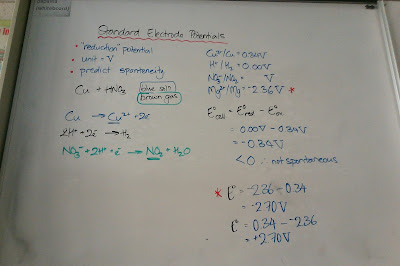Electrochemical cells comprise of two half-cells, one where oxidation occurs and one where reduction occurs. There are conventions for writing cell diagrams, which we need to understand.
Tuesday, 28 July 2015
Electrochemical Cells
We have already met the concept that spontaneous reactions have a positive net electrode (reduction) potential. It would make sense, therefore, that these chemical reactions generate a voltage (electricity).
Electrochemical cells comprise of two half-cells, one where oxidation occurs and one where reduction occurs. There are conventions for writing cell diagrams, which we need to understand.
Electrochemical cells comprise of two half-cells, one where oxidation occurs and one where reduction occurs. There are conventions for writing cell diagrams, which we need to understand.
Monday, 27 July 2015
Electrode Potential Calculations
We are expected to go over the theory behind electrode potentials ourselves, but we were shown how to use these values to justify if a reaction is spontaneous or not.
Identifying Species
Sometimes, it is unclear which species have been produced. We can use electrode potentials to justify which species are made, but some qualitative tests also help:
Friday, 24 July 2015
Half Equations
We started by looking at the reactions of potassium permangate under different conditions. This video shows the results:
We also need to know how to balance the half equations for these reactions:
Thursday, 23 July 2015
Half Equations
Another recap of Level 2 work...
If you want some help learning your redox pairs, try these FLASH CARDS
These FLASH CARDS are also excellent.
Oxidation-Reduction Introduction
Today was a recap of the key elements of Level 2 Redox that will be important to use for the topic and assessment in Level 3:
Subscribe to:
Comments (Atom)








